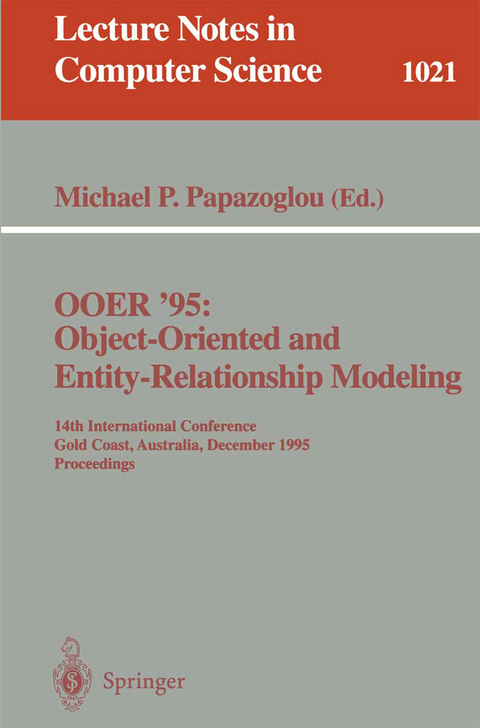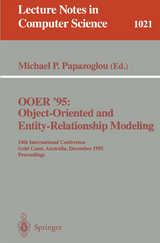OOER '95 Object-Oriented and Entity-Relationship Modeling
Springer Berlin (Verlag)
978-3-540-60672-7 (ISBN)
The 36 papers presented together with an invited presentation by Gio Wiederhold were selected from a total of 120 submissions. The papers are organized in sections on object design and modelling, models and languages, reverse engineering and schema transformation, behavioral modelling, non-traditional modelling, theoretical foundations, business re-engineering, integrated approaches, cooperative work modelling, temporal data modelling, federated systems design, and industrial stream papers
Modeling and system maintenance.- Adaptive schema design and evaluation in an object-oriented information system.- Assertion of consistency within a complex object database using a relationship construct.- A cryptographic mechanism for object-instance-based authorization in object-oriented database systems.- Unifying modeling and programming through an active, object-oriented, model-equivalent programming language.- A declarative query approach to object identification.- Versatile querying facilities for a dynamic object clustering model.- Reverse engineering of relational database applications.- A rigorous approach to schema restructuring.- Managing schema changes in object-relationship databases.- Behavioural constraints: Why using events instead of states.- Behavior consistent extension of object life cycles.- Color-X Event Model: Integrated specification of the dynamics of individual objects.- Database design with behavior and views using parameterized Petri nets.- SEER: Security enhanced entity-relationship model for secure relational databases.- Neural network technology to support view integration.- Database schema transformation and optimization.- Mapping an extended entity-relationship schema into a schema of complex objects.- Binary representation of ternary relationships in ER conceptual modeling.- Variable sets and functions framework for conceptual modeling: Integrating ER and OO via sketches with dynamic markers.- A logic framework for a semantics of object oriented data modelling.- Object-oriented meta modelling.- A conceptual model for business re-engineering methods and tools.- Data model evolution as a basis of business process management.- Reengineering processes in public administrations.- Uniqueness conditions for ER representations.- Rapid prototyping: An integrated CASE based approach.- Integrating and supporting Entity Relationship and Object Role Models.- From object specification towards agent design.- Conceptual modeling of workflows.- An object oriented approach for CSCW system design.- Semantics of time-varying attributes and their use for temporal database design.- Handling change management using temporal active repositories.- A graphical query language for temporal databases.- Managing object identity in federated database systems.- Management of inconsistent information in federated systems.- Resolving structural conflicts in the integration of Entity-Relationship schemas.- Use and control of data models: A repository approach.- The seven habits of highly effective data modellers (and object modellers?).- Object responsibility categories in support of top-down object discovery.- Denormalisation as an OO extension.- Development of a financial markets analytical product: A MOSES casestudy.- The practice of nuclear integrated design and engineering database establishment using object-oriented DBMS.- Application of "consistent dependency" to corporate and project information models.- The use of agglomerative categorisation to build a conceptual view of statistical data.
| Erscheint lt. Verlag | 23.11.1995 |
|---|---|
| Reihe/Serie | Lecture Notes in Computer Science |
| Zusatzinfo | XVII, 459 p. |
| Verlagsort | Berlin |
| Sprache | englisch |
| Maße | 155 x 235 mm |
| Gewicht | 626 g |
| Themenwelt | Informatik ► Theorie / Studium ► Algorithmen |
| Schlagworte | data model • Data Modelling • Datenmodellierung • Entity Relationship • Entity-Relationship-Datenmodell • Entity-Relationship Modellierung • Entity-Relationship Modelling • Hardcover, Softcover / Informatik, EDV/Informatik • HC/Informatik, EDV/Informatik • HC/Informatik, EDV/Programmiersprachen • Informationssysteme-Modellierung • Information Systems Modelling • Modeling • object • Object-Oriented Databases • Objektorientierte Datenbanken • Objektorientierte Programmierung • Reverse Engineering |
| ISBN-10 | 3-540-60672-6 / 3540606726 |
| ISBN-13 | 978-3-540-60672-7 / 9783540606727 |
| Zustand | Neuware |
| Haben Sie eine Frage zum Produkt? |
aus dem Bereich




